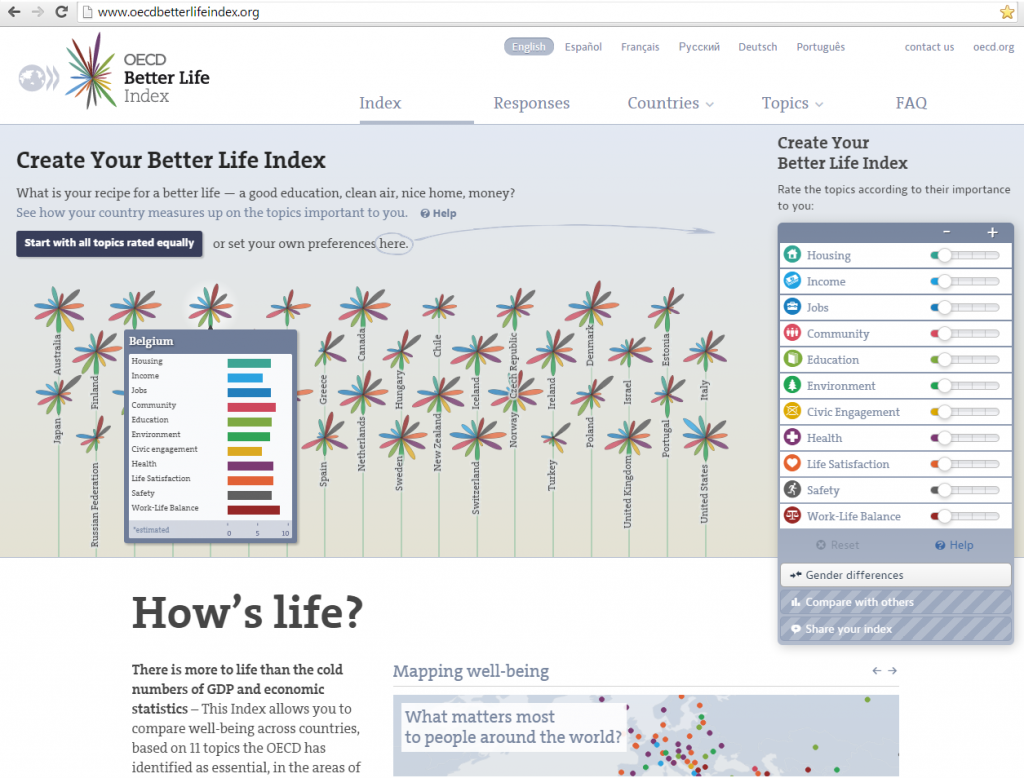Almost fifty year since the famous speech by Robert F. Kennedy, and almost ten years after the start of a thorough debate on ‘beyond GDP’, it’s time to meet the unfilled promise.
On some occasions before, I have written blog posts to encourage EU policy makers and politicians to step up their ambitions and integrate ‘beyond GDP’ indicators in their policies. For instance, see posts on ‘Gross European Happiness‘ or ‘An EU Happiness Manifesto‘, and an essay I wrote for the Next Generation for Europe magazine NGE Magazine 1 (Chapter three, pdf).
And I must say, the topic is on the agenda. I recently had the fortune to attend a European Commission expert conference on ‘beyond GDP’. Noting the importance of the topic, the conference was opened by two outgoing Commissioners: Laszlo Andor, for Social Affairs, and Janez Potocznik, for Environment.
Winning the battle of measurement…
How to make the giant leap from theory to practice? Enrico Giovannini, a former Italian Minister and OECD Chief Statistician, has pushed the debate on GDP forwards in the recent decade. He asked whether those supporting the idea of beyond GDP have won or lost in the debates from the last years. His conclusion was that the ‘battle of measurement’ has been won. In comparison to ten years ago, national statistic offices do a lot more effort to measure what matters.
Routine measurements of social and environmental indicators allows us to get a broader understanding of quality of life than economic growth and inflation could give us. They are more and more interested in collecting and refining social figures on employment rates, NEET rates (people Not in Education, Employment or Training – a proxy for youth employment), and inequality-adjusted GDP growth. Environmental numbers like generated waste, emission of green house gasses and water use also gain more prominence. And new indices like the OECD Better Life Index treat all indicators equally.
… but the battle for policy must still be fought
There are two questions around this: do we measure enough? And do we do enough to exploit this massive amount of data and adapt our policies to it? When asking whether we won the battle of policy, the answer from Giovannini is simple – no. If you want to make simple policies from these crunched numbers, you have to make trade-offs. How much air pollution is an increase in GDP of 1% worth? How much fossil fuels can you burn to lift one thousand people out of poverty? And what, objectively, is well-being anyway? These are incredibly difficult questions to answer. Economic growth is a lot easier objective. There is no easy way out.
Can economic, environmental and social betterment go hand in hand? The Commission – via its stated objective of smart, sustainable and inclusive growth – thinks so. But MEP Philippe Lamberts doesn’t agree. He believes that in a finite planet, sustainable growth is an inherent paradox. From an environmental perspective, we may need degrowth; but at the same time, that has consequences on employment. And, higher growth is also associated with more money invested in environmental protection.
How do you cut this Gordian knot?
The quest for perfection limits action
Nobody can easily answer these complex these questions. But I can offer my own conclusions:
- A lot of laudable work is being done by statisticians and policymakers, especially in social and environmental departments. With a lot of conviction and passion, they had managed to put the issue on the agenda. But they need to get economists more involved in these debate to get more leverage. It was telling that very few participants were trained economists.
- Call me a pessimist, but my feeling is that the political momentum behind the beyond GDP drive is fading. There are generic references to the agenda, but the policy efforts needs to be stepped up. In my view, policymakers need to be more courageous and bring their policies to main stream politics. That requires broad political campaigning and communication, as the new economics foundation also writes (pdf). Reports don’t change reality. Action does.
- Finally, maybe it is a quest for perfection that is limiting action. A perfect measurement of well-being does not exist. If you group indicators together in one figure – say well-being is ’42’ – you can make little sense of it. Similarly, a ‘dashboard’ with eleven different figure as in the OECD Better Life Index can be difficult to apply. But in this case, it appears the perfect is the enemy of good. GDP also has been refined often. It’s better to refine measures and policies of well-being on the way than to never start the journey.
Beyond GDP: a long road to travel, but one that is worthy to go.

